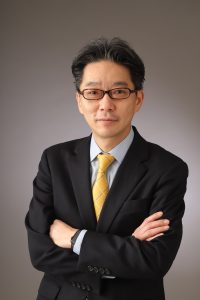
2022 is a year that the future will deem a turning point in history. In the midst of such historical events, the media is expected to be at the frontline. This expectation is even more pronounced in the digital age, where social networking is literally instantaneous. But as journalists, it is still as important as ever to be able to stand up to power. Like in the story “The Emperor’s New Clothes,” it is the duty of journalists to proclaim the emperor as naked.
At this historic juncture, it has never been more evident that Japan’s traditional major media have lost their ability to respond. This is due to the growing alignment with power, both as a media enterprise and among many journalists. When I saw this reality, I realized that now is the time for a new media that can stand its ground and serve the interest of the people. I resigned from the Asahi Shimbun at the end of June 2022 after 29 years as a reporter and started Arc Times in July.
During the month of July after the assassination of former Prime Minister Shinzo Abe, nearly 2,000 reporters of Japan’s major newspaper, frightened that they might be harmed if they reported on the Unification Church, shriveled up and almost refused to report the story. It was a great shock to me. Ultimately, it was thanks to the reporters who were aware of the risk and continued to report that we were able to expose the reality of the Unification Church. It was TV stations such as NTV and TBS, and spirited journalists such as Yoshifu Arita and Eito Suzuki, and by online media like ours which would shake the very foundations of the Unification Church and the Kishida administration. The leading figures in news reporting are beginning to shift away from the major newspapers.
The deterioration of the media is particularly evident at front-line sites such as press conferences. At Ministry of Finance press conferences, it is not uncommon for some of the reporters from major news outlets who serve as moderators to strictly limit their questions to two, or to brush off my questions by simply saying: “The minister is busy.” In the White House and the British Prime Minister’s Office where I have worked, reporters usually collaborated to ask questions and elicit answers from the authorities. In Japan, however, some reporters are now aligned with politicians, bureaucrats, and other powerful people.
Reporters of major media outlets in Japan, especially those in the political affairs section, not only depend on the power of the politicians they cover man-to-man with to determine their own advancement in the media, but in some cases, they are also taken care of after they retire from their jobs. The immoral proximity between reporters and those in power is a problem unique to Japan among developed countries.
The “major Japanese media,” which is “integrated with power,” and the “Japanese reporters,” which are “too close to those in power,” cannot report for the benefit of their readers and viewers.
I have not only covered Kasumigaseki and Nagatacho, political and bureaucratic town in Japan, for many years, but I have also covered President Obama, then-Vice President Biden, and other Presidential Cabinet members directly at the White House. Until last year, I was on the West Coast of the U.S., in front of Google CEO Sundar Pichai, Amazon founder and Chairman Jeff Bezos, and Tesla CEO Elon Musk, and asked them direct questions. Through these experiences, I would like to continue the basic media stance I have developed in Japan and around the world: when confronting power, always stand on the side of the people, and provide material that will encourage critical thinking and action.
I believe that such reporting requires the creation of a media outlet run by strong individuals who can take responsibility. That is why I founded Arc Times. We are not a mouthpiece of the politicians, bureaucrats, or big businesses. Instead of criticizing from the outside, we will dive into the heart of the matter, look at events and issues with an open mind, add our expert analysis, and thoroughly stand by our readers and viewers to report the essence of the news.
We believe that there are many citizens in Japan and around the world who are questioning the current state of major media outlets. The Arc Times YouTube channel, launched in July, has grown to over 30,000 subscribers and 1.3 million views per month in five months. We are beginning to break into the ranks of major similar news channels, and we feel that this is a great response to our efforts.
There are also many honest and talented reporters and young journalists inside and outside of the major media outlets who feel ashamed of their work and are worried about what they think of the existing media. I believe that there are many engineers who would like to work to make an impact on society by utilizing their high level of expertise in the media as well. We hope that these people will be interested in this new project and join us.
For civil society in Japan and around the world, it is essential to have a sound media that keeps a proper distance from various powers such as politics, government, and corporations, and thoroughly stands on the side of citizens, reporting the essence of news without any discernment. Arc Times hopes to be the embodiment of such a media.
Please stay tuned for further developments at Arc Times.
December 30, 2022
Founder&CEO, Editor-in-Chief, Toshi Ogata
